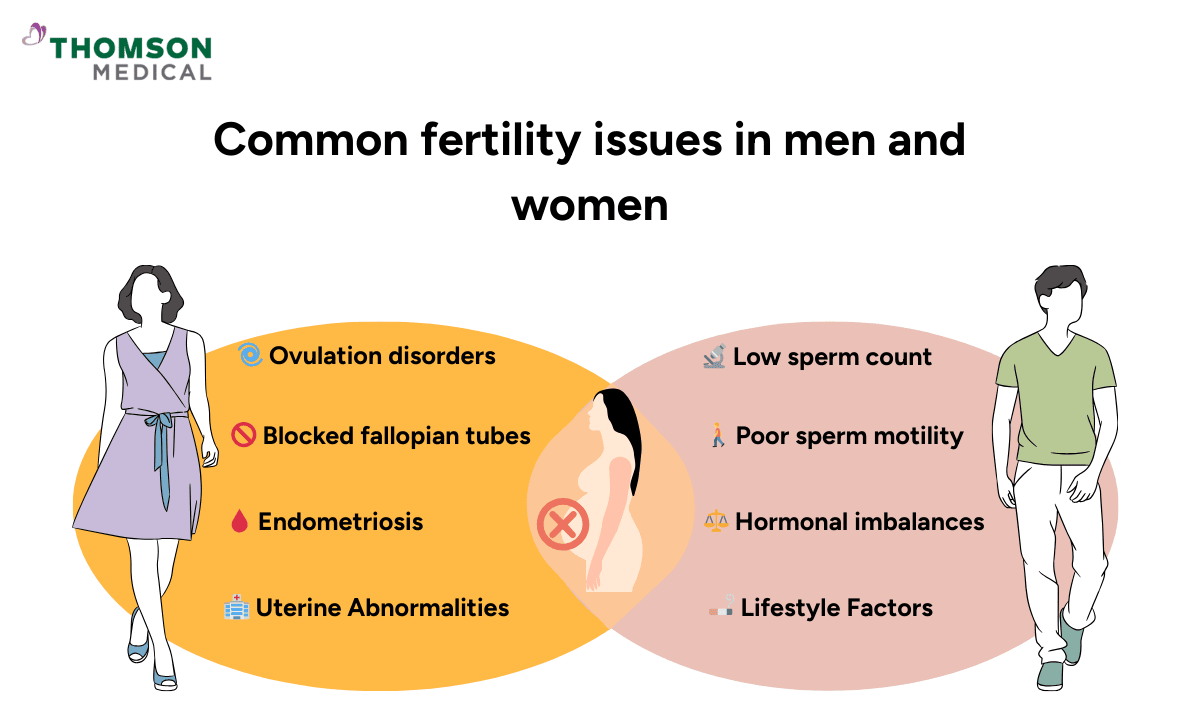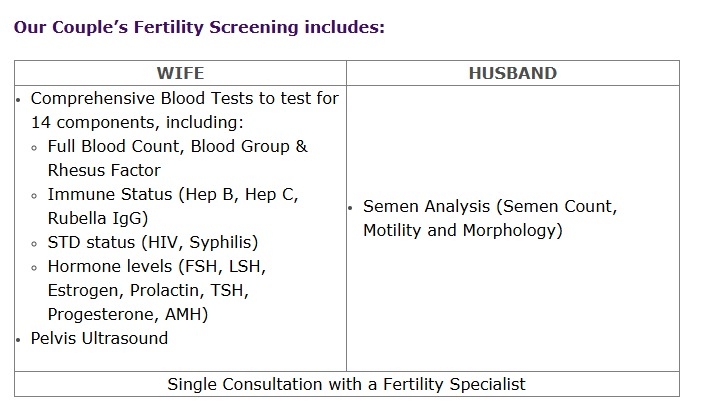Whether you're lying awake wondering, 'Am I running out of time?' or you've been trying for months without success, that constant uncertainty about your fertility doesn't have to control your life decisions. Many women in Singapore are asking the same questions — and a fertility test can finally give you the clarity to move forward with confidence.
What is a fertility health check?
A fertility health check is a comprehensive assessment designed to help you and your partner understand your reproductive health.
During this assessment, your doctor will examine your physical health, hormonal balance, and lifestyle factors that might affect your chance of conceiving.
When do I need to consider fertility testing?
You may consider fertility testing if:
You've been trying for over a year, and every negative test feels like another piece of hope slipping away.
You experience irregular periods or no periods. This makes it difficult for you to plan or track ovulation effectively.
You've had multiple miscarriages.
You're a man with a history of testicular issues or injuries.
You have known health problems that could affect fertility, such as polycystic ovary syndrome (PCOS) or thyroid disorders.
You're planning ahead and want to make informed decisions about career timing and family planning.
You're concerned about your egg or sperm quality due to age or lifestyle factors such as smoking, alcohol use, or obesity.
You're considering assisted reproduction techniques, such as IVF (in vitro fertilisation).

What are common fertility issues?

Infertility occurs when you and your partner have been trying to conceive for 12 months or more without success despite regular unprotected intercourse. This condition may affect both man and woman fertility and can stem from various factors.
Common causes of infertility in women
Ovulation disorders:
Conditions like PCOS or thyroid imbalances can disrupt your regular ovulation cycle.
Blocked fallopian tubes:
This condition is often caused by infections, endometriosis, or previous surgeries.
Endometriosis:
A condition where tissue similar to your uterine lining grows outside your uterus, potentially affecting your fertility.
Uterine abnormalities:
Issues such as fibroids, uterine polyps, or structural variations in your uterus that may interfere with conception or pregnancy.
Age-related decline:
Your egg quantity and quality naturally decrease as you age, particularly after 35.
Causes of infertility in male
Low sperm count:
Having fewer sperm reduces the chances of fertilisation.
Poor sperm motility or shape:
Your sperm need proper movement ability and structure to successfully reach and fertilise an egg.
Hormonal imbalances:
Low testosterone or other hormone irregularities can affect your sperm production.
Varicocele:
Enlarged veins in your scrotum can increase temperature and compromise sperm quality.
Lifestyle factors:
Factors such as smoking, excessive alcohol consumption, obesity, and exposure to environmental toxins can impact your sperm health.
If you're finding it difficult to conceive, have irregular menstrual cycles, or are concerned about other fertility signs, it's important to speak with a healthcare professional. Request an appointment with Thomson Medical for a comprehensive fertility evaluation.
Our fertility specialists will guide you through every step—from testing to diagnosis—and create a personalised care plan tailored to your needs. Whether you're just starting your journey or exploring treatment options, we're here to support you.
What is involved in a couple's fertility check-up?
When you and your partner have made the decision to perform a fertility health check, your evaluation will typically include:
Medical history review:
Your doctor will discuss your past health conditions, how regular your menstrual cycles are, and any previous pregnancies or reproductive experiences.
Physical examination:
You'll both undergo appropriate examinations to identify any physical conditions that might be affecting your fertility.
Hormone testing:
Blood tests will assess important reproductive hormones in both you and your partner to ensure your hormonal systems are functioning properly.
Imaging studies:
You may have diagnostic imaging such as ultrasounds or a hysterosalpingogram (HSG) to examine your uterus and check if your fallopian tubes are open.
Semen analysis:
Your partner will provide a semen sample that will be evaluated for sperm count, movement capability, and shape.
It is important that both of you participate in the fertility assessment, as fertility challenges can stem from factors relating to either partner or a combination of both.
Fertility testing for women
During your fertility evaluation, you may undergo several specialised female infertility tests to assess your reproductive health.
Blood tests:
Your doctor will check your hormone levels, including oestrogen, progesterone, FSH (follicle-stimulating hormone), and AMH (anti-Müllerian hormone, which indicates your egg reserve) to evaluate your hormonal balance.
Ultrasound scans:
These imaging studies allow your healthcare provider to examine your ovaries, uterus, and follicles (the small sacs that contain your eggs) to identify any physical issues.
Hysterosalpingogram (HSG):
This X-ray procedure checks for blockages in the fallopian tubes and evaluates the shape of the uterus.
During this test, your doctor will introduce contrast dye through the cervix and take X-rays to see if the tubes are open. Blocked tubes can stop the egg from meeting the sperm.
Ovarian reserve testing:
These assessments help determine the quantity and quality of your remaining eggs, giving you and your doctor important information about your reproductive potential.
Fertility testing for men
As part of your fertility evaluation, you may undergo several specific tests:
Semen analysis, which looks at:
Sperm count (how many sperm are present)
Sperm motility (how well the sperm move)
Sperm morphology (shape and structure)
Semen volume (how much fluid is produced)
Blood tests:
Your doctor will check your testosterone levels and other reproductive hormones to ensure they're supporting healthy sperm production.
Scrotal ultrasound:
This imaging test examines your testicles and surrounding structures to identify conditions like varicocele (enlarged veins) or other issues that might affect your sperm production.
Genetic testing:
In some cases, your doctor may recommend genetic tests to rule out inherited conditions that could be affecting your fertility.

Fertility Doctors
Loading...
What happens after a couple's fertility assessment?

After your test results become available, your doctor will guide you through several important steps:
Explain your findings:
Your doctor will review all test results with you, identifying any specific issues that might be affecting your fertility.
Discuss your fertility treatment options:
Based on your unique situation, your doctor will recommend appropriate treatments, which might include lifestyle modifications, fertility medications, surgical procedures and assisted reproductive techniques like IVF or IUI (intrauterine insemination).
Provide personalised guidance:
You'll receive specific recommendations on ways to enhance your fertility naturally, including dietary adjustments, appropriate exercise, and avoiding substances that might harm your reproductive health.
Fertility assessment at Thomson Medical
Since 1985, Thomson Fertility Centre has provided fertility assessment services for couples planning to start a family or those seeking evaluation of their reproductive health in Singapore.
Our comprehensive fertility screening, which costs $490.50 (inclusive of GST), assesses both partners through standardised diagnostic tests and specialist consultation.

Your fertility assessment experience includes:
Both partners are assessed by the same fertility team during coordinated appointments — no back-and-forth, no wasted time.
Results are explained in clear, simple terms, always connected to your personal timeline and family goals.
Testing, consultation, and follow-up all happen under one roof — no confusing handoffs between different clinics.
You’ll meet directly with experienced fertility doctors, not just general practitioners who refer you onwards.
We have a long-standing track record of more than 35 years helping couples through these exact concerns.
Whether your results show everything is on track or highlight areas to address, you’ll leave with a clear, personalised plan forward.
Request an appointment with our fertility specialists at Thomson Fertility Centre.
FAQ
When should I consider getting a fertility test?
You should consider fertility testing if you have been trying to conceive for more than 12 months (or 6 months if the woman is over 35), have irregular periods, have a history of miscarriages, or have known reproductive health conditions such as PCOS or endometriosis.
How can I check my fertility in Singapore?
In Singapore, you can check your fertility through:
Public or private hospitals:
Public hospitals are generally more affordable and may be partially subsidised; however, waiting times can be longer. Private hospitals provide quicker appointments and more personalised care, albeit at a higher cost.
Private fertility clinics:
These clinics provide appointments at a faster rate, personalised care, and a wide range of fertility tests.
General practitioners (GPs):
Your GP can provide basic fertility assessments and refer you to appropriate specialists when needed.
Can I do my fertility test at home?
Yes, you can perform certain fertility tests at home, but they have limitations:
Ovulation predictor kits:
It will help you track if and when you are ovulating.
Hormone test:
The AMH test can determine your egg reserve, or the number of eggs you still have.
At-home sperm test kits:
These kits can check sperm count but don’t assess sperm movement or shape, which are important for fertility.
While home testing provides basic insights, these tests aren't as comprehensive or reliable as clinical evaluations. For a complete assessment of your fertility, a doctor's evaluation is recommended.
Can I go to my GP for a fertility test?
Yes, you can. Many GPs offer basic fertility checks. Your GP can:
Review your medical history
Order blood tests to check your hormone levels
Refer you for ultrasounds or semen analysis
For more specialised or in-depth fertility assessments, your GP will refer you to a specialist.
Can men freeze sperm in Singapore?
Yes, sperm freezing (also called sperm cryopreservation) is available in Singapore. Your sperm can be stored for many years and used later for assisted reproductive techniques like IVF or IUI. Fertility clinics and hospitals offer this service.
You might consider freezing your sperm if you:
Have a medical condition or upcoming treatment that could affect your fertility (such as cancer treatment)
Travel frequently or want to preserve your fertility for future family planning
Are planning to undergo a vasectomy but want to keep your options open for having children later
Is a fertility test painful?
Most fertility tests are not painful, though some may cause mild discomfort:
Blood tests:
You might feel slight discomfort from the needle prick.
Ultrasound scans:
Transvaginal ultrasounds may feel uncomfortable but aren't typically painful.
Semen analysis:
This method involves no pain, just a simple sample collection.
Hysterosalpingogram (HSG):
This dye test checks your fallopian tubes; some women experience mild cramping during the procedure.
If you're concerned about discomfort during testing, discuss the matter with your doctor—they can suggest ways to make your experience more comfortable.
Is it necessary to have all tests done at once?
Not necessarily. The fertility specialist will usually start with a basic assessment, including blood tests, ultrasound scans, and semen analysis. They will determine the need for additional tests based on the results. The approach is often step-by-step to avoid unnecessary procedures.

The information provided is intended for general guidance only and should not be considered medical advice. For personalised recommendations based on your medical conditions, request an appointment with Thomson Medical.
For more information, contact us:
Thomson Fertility Centre
- Paragon: 6252 7766
Thomson Specialists (Women's Health)
Thomson Women's Clinic
- Novena:
6592 6686 (Call), 8611 8986 (WA) - Bukit Batok:
6569 0668 (Call), 8686 3525 (WA) - Choa Chu Kang:
6893 1227 (Call), 8282 1796 (WA) Jurong:
6262 8588 (Call), 6262 8588 (WA)- Katong (female doctor):
6970 2272 (Call), 8611 9020 (WA) - Punggol:
6243 6843 (Call), 8811 0328 (WA) - Sembawang: 6753 5228
- Sengkang: 6388 8125
- Serangoon (female doctor): 6382 3313
- Tampines: 6857 6266
- Tiong Bahru: 6276 1525
